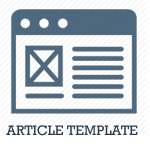ANALISIS KOMPARASI PRESTASI BELAJAR ANTARA MAHASISWA AKTIF DAN TIDAK AKTIF BERORGANISASI DI PROGRAM STUDI NERS UNIVERSITAS ESA UNGGUL
Abstract
Abstract Student organization is a forum for students to proceed both in learning and education acquired through activities conducted in formal and non-formal. Activeness of students in the organization have a role in learning achievement. In student organizations can foster soft skills naturally. Objective This study analyzes differences Learning Achievement of Students Active and switched on organizational At Ners Studies Program Esa Unggul University. The independent variable active and inactive student organization, Dependent Variables learning achievement. Sample 66 students of 4th semester and 6th semester Ners Studies Program Faculty of Health Sciences University of Esa Unggul Jakarta from 2015 to 2016. Sampling technique with purposive sampling. The research method uses kuantitatiif approach to the comparative method. The analytical method used is the analysis of the Independent-Sample T-Test. Collecting data using questionnaires and secondary data from the Department of Academic Administration. Research Hypothesis is Learning Achievement There is a difference between Active and Inactive Students Organize in Nursing Studies Program Esa Unggul University. Based on t-test value Sig .174, t count 1,378> t table 0.383. H0 failed rejected. Thus there is no significant difference between students' learning achievement active in organizations and achievement of students do not actively organize. Students actively obtain the benefits of the activity in the student organizations that improve the Soft Skill that can be used in the workplace.
Keywords: active and inactive students organize, learning achievement
Full Text:
PDF (Bahasa Indonesia)References
Hamalik. (2008). Psikologi Belajar dan Mengajar. Bandung: Sinar Baru.
J. Winardi. (2003). Teori Organisasi dan Pengorganisasian. Jakarta: Rajagrafindo Persada.
Lapau, Buchari. (2012). Metode Penelitian Kesehatan. Yayasan Pustaka Obor Indonesia.
Nursalam, (2003). Manajemen Keperawatan Aplikasi dalam Praktek Keperawatan Profesional. Surabaya: Salemba Medika.
Nasution. (2010). Berbagai Pendekatan dalam Proses Belajar dan Mengajar. Jakarta: Bumi Aksara.
Purwanti.M, (2004). Psikologi Pendidikan. Bandung: Remaja Rosda Karya.
Paryati Sudarman. (2004). Belajar Efektif Di Perguruan Tinggi. Bandung: Simbiosa Rekatama Media.
Sofiudin M. Dahlan. (2008). Statistik untuk Kedokteran dan Kesehatan. Jakarta: Salemba Medika.
Syaifudin, Bahri Djamarah. (2008). Psikologi Belajar. Jakarta: Rineke Cipta.
Syah. M. (2010). Psikologi Belajar. Jakarta: Raja Grafindo.
Slameto. (2003). Belajar dan Faktor-faktor yang Mempengaruhinya. Jakarta: Rineka Cipta.
Siti Pariani dan Nursalam. (2001). Metodologi Riset Keperawatan. Surabaya: CV Sagung Seto.
Sugiyono. (2013). Metode Penelitian Kuantitatif Kualitatif dan R&D. Bandung: Alfuabeta.
Sudjana, Nana dan Ibrahim. (2009). Penelitian dan Penilaian Pendidikan. Bandung : Sinar Baru Algensido
Sukmadinata, N. S. (2009). Metode Penelitian Pendidikan. Bandung: PT. Remaja Rosdakarya.
DOI: https://doi.org/10.47007/ijnhs.v1i02.1718
Refbacks
- There are currently no refbacks.



